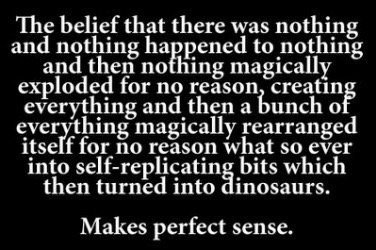@GraceFromEP:
Heaven would be horrible. I would never want to live for an eternity. If I knew that was what awaited me, I would dread it. Eternity is a prison, and even the nicest and most comfortable prisons, are still prisons.
That's the equivalent of saying God exists because God exists. That logic is fine for your personal beliefs, but if that's the logic you're going to use, don't try to argue it with anyone else. As for whether science could exist without God, the answer is yes. Definitely. From my perspective, it does. To answer the question: "how did the first single-celled organism originate? By chance?" Simply put, yes. But think of it like this. If the chance of life evolving around our star was 1 in a quadrillion(1,000,000,000,000,000), with about a sextillion(1,000,000,000,000,000,000,000) stars in the observable Universe (And probably much more outside our observational limits), that leaves a predicted million star systems with life. So yes, it would happen by chance.
If the fingerprints of God cannot be missed, then why doesn't the scientific community pick up on them? And I find it incredibly hypocritical to base your belief in God on "fingerprints" (That, miraculously, atheists just can't see), and then claim that Evolution is unsubstantiated when scientists use fossil evidence, etc. (fingerprints of evolution, and these "fingerprints" aren't invisible. Imagine that.) to show Evolution.
You have no evidence for your claim that my reason and logic comes from God, and that very same reason and logic tells me that there is no evidence to be found.
Birth is not a miracle, it's a dangerous, messy and flawed biological process that usually produces living babies, but only has a serviceable infant mortality rate with advanced human technology only invented in the last century or so, and occasionally kills the mother too. (Not so occasionally before the previously mentioned medical technology was invented.) It was also mostly driven by rape for many millennia, but apparently the Bible is okay with that.
No, scientists can't quite make a functioning eye. Yet. (Though we're not far now). Science can't show or explain everything, but that's why we're still doing it. We seek understanding.
That picture shows nothing more than a collection of serious misunderstandings of the scientific theories about the beginning of the Universe, and an even more serious misunderstanding of Evolution by Natural Selection.
The truth is, we don't know how the Universe began. (And, as scientists, we don't care why, because science explains the universe, it doesn't, and doesn't try to, give meaning.) But just because we don't quite know how the Universe began doesn't mean we can't dismiss other hypotheses, like the idea that God created the Universe, as described in Genesis. That has no evidence, and so it can be dismissed.
The Big Bang Theory is widely misunderstood. Put simply, the theory states that at one point billions of years ago, space and time was created, and matter began to expand outwards from a single point. Again, science assigns no meaning. If you wish to believe that the cause of this was God, you can go ahead. But that doesn't necessarily make it true for anyone else. There are plenty of other theories out there about how it started. The key word being "How". The entire reason that science and faith can coexist is because science tells you how things happen, and faith is free to tell you why.
The only reason I ever have problems with people of faith are the following:
1) Attempts to use faith to curb the rights of other people (for example being against same-sex marriage because your religion says it's bad. That's not ok, clearly these people don't believe that, and no religion has the right to influence people that are not within it)
2) Trying to claim that their creation stories are literal facts. Science tells you how things happen. That is the entire purpose of it. It's up to you to assign meaning.
3) Teaching said creation myths to impressionable children (If you must teach them to believe in God, don't let them believe the myths are literal).
4) Any hypocrisy (Gay, child-molesting priests, etc.) and hatred towards others.
I just realised how long this is. Brings me back to the days of writing essays at school. If only I'd had the drive to write then that I do now. If you read all of this, thank you. It's a seriously long thing, and I wouldn't blame anyone for falling asleep after the first few lines alone. I have to say I'm quite enjoying our debate. We may disagree wildly, but it's good to talk about these things. It's not my hope to convert you at all, just to make you think, and to explain how atheists, or at least this atheist, views the world. Have a nice day!







